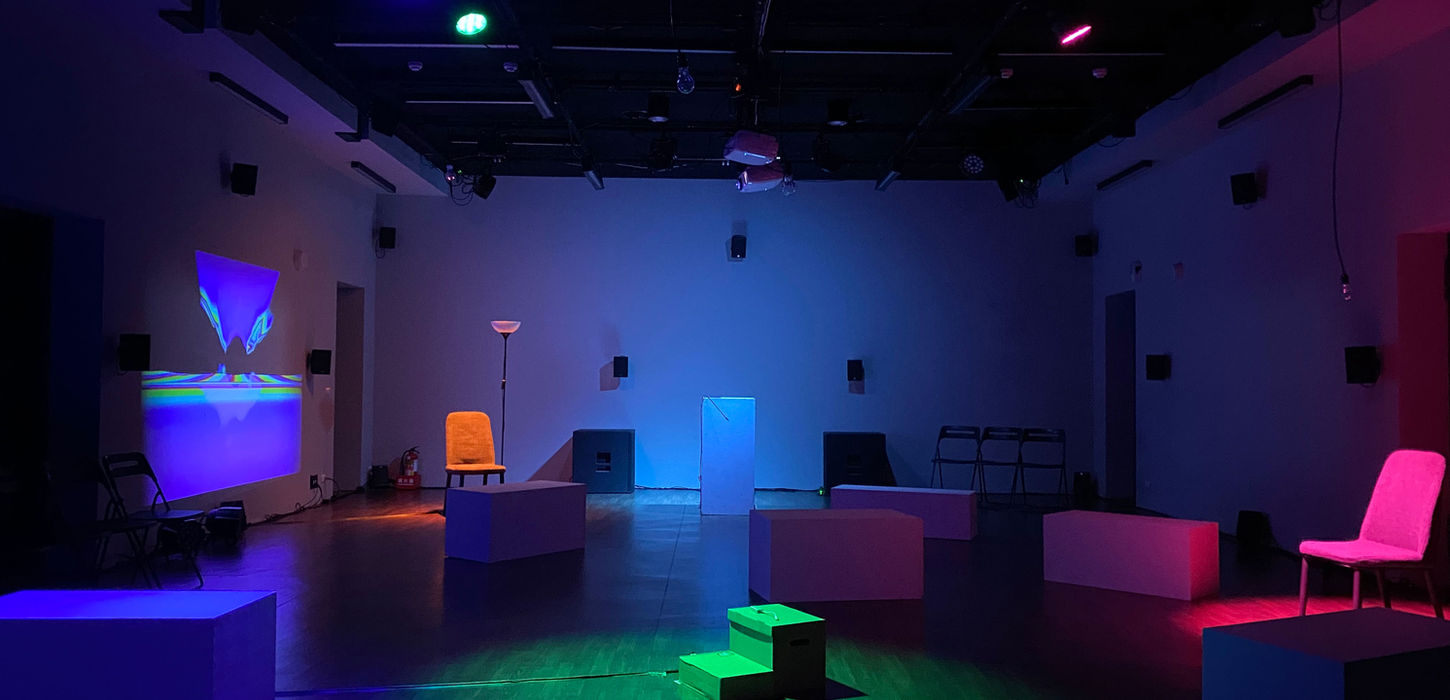
國立臺灣師範大學|音樂科技跨域合作組
Admissions
入學資訊
Eligibility
Applicants must hold a bachelor’s degree in a relevant field from a domestic or international university (including those who expect to graduate in the current academic year), or possess equivalent academic qualifications.
Application Time
Apply Online before 5:00 p.m., December 4, 2025 (Thu.)Examination Format
Application ReviewWritten Test: Interdisciplinary Collaboration in Music Technology (30%), Music Theory and History Overview (20%), English (10%)
Interview (40%): Instrument performance and portfolio presentation
For details, please refer to the provided link.Examination Dates
Oral Examination: From Feb. 6 to Feb. 7, 2026
Written Examination: Feb. 8, 2026 (Sun.)
Eligibility
Applicants must hold (or expect to hold) a bachelor’s degree in music or related fields from an accredited institution, or possess equivalent qualifications.
Application Deadline
By October 9, 2025, via online registration and document upload.Assessment Components
Application Review 25%, Written Test 25% (related to interdisciplinary collaboration in music technology), Interview 50% (instrument performance skills and portfolio presentation). For details, please refer to the provided link.
Examination Date
October 31, 2025
Study Period
2–4 years, with a maximum of 2 years of leave permitted.
Degree Awarded: Master of Music (M.M.).
Graduation Requirements-
Complete 32 credits (including 4 credits from common required courses: “Special Topics in Music Art” and “Research Methodology / Music Interdisciplinary Research Methodology”).
-
Pass a foreign language proficiency test (English, French, German, or Italian at B1 level or equivalent).
-
Each division requires professional outputs (e.g., recital, composition presentation, interdisciplinary performance) and a thesis oral defense.
Thesis Examination
Apply before the end of March or October each year, submitting transcripts, thesis, and originality report.-
Do I have to major in composition? My major is performance. I have some experience with DAW, and have participated in some music and theatre productions. Can I apply?
The Interdisciplinary Studies in Music and Technology welcomes musicians from any background to apply. If you're unsure whether your current major aligns with the career you want to pursue in the future, this group could be an option for you.
Do I need a music undergraduate degree to apply for this program? I have a background in science and technology, but have studied music instruments and have always been interested in music.
The ISMT program welcomes students from any background to apply. However, there are requirements such as understanding a certain level of music theory, instrumental performance and performance art forms. The entrance oral examination includes a section on your instrumental performance.
Regarding the requirement to submit a "A portfolio includes interdisciplinary creations using music and technology," does this mean only personal creations can be included?
Of course we encourage collaborations. Just remember to specify your roles and contributions in the collaborative projects or productions.
Regarding the technology aspect, is it necessary to be able to use software like MAX/Msp to qualify as technology?
No, it's not necessary. There are no limitations on creations or productions using specific software or hardware. Technology is an aim; the core value of this program is to learn the CONCEPT of interdisciplinary integration. However, the program does lean towards the use of cutting-edge technology tools to integrate different forms of performing arts or create social/cultural collaborations.
修業年限
2至4年,可申請休學最多2年學位名稱
音樂碩士(Master of Music, M.M.)
畢業條件-
修滿32學分(必修8學分:音樂科技跨域合作專題研究(一)(二)、音樂跨域研究方法論、音樂科技藝術專題。組選修12學分。自由或跨校選修12學分)
-
通過外語能力檢定(英語、法語、德語、義大利語B1級或同等)
-
48小時校外跨域合作實習證明與成果報告
-
通過論文口試與跨域展演發表會(或跨域計畫公開呈現)
-
請問這組一定是要學創作的嗎?我是演奏組背景的,有接觸一些編曲軟體,參與過一些音樂加戲劇的演出製作,可以報考嗎?
「音樂科技跨域合作組」不限任何背景的音樂家來報考。如果你不太確定目前的專業是否為將來要走的路,那這組可以是你的選擇。
請問這組一定是要音樂本科才能報考嗎?我是理工背景的,有學習過樂器,一直對音樂有興趣。
「音樂科技跨域合作組」亦不限任何背景的學子來報考,但對於音樂知識、樂器演奏與表演藝術上的接觸與認知,有一定程度的要求,入學口試包含樂器演奏的考試項目。
請問有關「請繳交一份與音樂科技跨域合作相關之創作Porfolio」,所謂創作是一定要我自己個人的創作嗎?
當然不一定是個人創作 ,更鼓勵呈現你在一個團隊共同創作/製作中的角色與工作範圍。
請問科技的部份,一定是要使用像是MAX/Msp等軟體才算是科技嗎?
當然不是,也不限使用任何軟硬體的過往創作/製作。科技只是工具,學習跨域整合的概念、心法與執行才是本組的核心精神。惟本組較傾向為培育能應用與時俱進的科技工具,整合表演藝術、新創形式或實質社會合作之跨域人才為宗旨。
以音樂—聲響為主體的跨域合作
臺師大音樂系碩士班「音樂科技跨域合作組」(Interdisciplinary Studies in Music Technology,以下簡稱ISMT)以培養音樂跨域人才為基,在修業期間,致力於多元跨域合作,從表演藝術或其他新呈現形式、教育或社會合作,到音樂科技工具或軟體技術開發,踏實邁向從發想至思辨、從觀察到合作、從策畫至執行的過程。 ISMT成立於2022年,至今已執行多場演出與發表,並就地利與MOU學術約定,長期與空總C-Lab臺灣當代文化實驗場的臺灣聲響實驗室、聲響藝術節成為重要合作夥伴,其先進設備與技術內容,讓課程、專題與展演得以更加落實,強化學術研究與文化場館的連結,以及跨域創作與人才培育的生態鏈。近期,臺師大更與美國史丹佛大學電腦音樂與聲響研究中心(Center for Computer Research in Music and Acoustics, CCRMA)簽訂MOU雙邊學術交流,已完成多場線上/實體工作坊、EMI雙邊課程與跨國展演。 當代跨域合作已是日常,音樂-聲響更得以憑藉其獨特的聽覺本質,從抽象的感知經驗出發,與幾乎所有藝術形式巧妙交融,甚至成為創作起點與主導力量。為此,ISMT課程的核心精神從不僅只於軟硬體操作的學習,更關注學生的批判思考、創意探索,以及跨越藝術與科技邊界的協作能力。我們相信,嘗試、探索與偶爾的失敗,都是走向理解與創新的必經之路。 ISMT歡迎有志於探索科技的「音樂人」,也為追求藝術表達的「科技人」敞開大門。身為綜合大學的臺師大校園,匯聚了資工、設計、美術、文學、教育與外語等豐沛人才與資源,正是跨域實踐的最佳基地。在這裡,來自不同領域的人們在此相遇,孕育出原本不存在的全新想法。
Music and Sound-Centered Interdisciplinary Collaboration
The Master’s Program in Interdisciplinary Studies in Music Technology (ISMT) at the Department of Music, National Taiwan Normal University (NTNU), aims to cultivate interdisciplinary expertise in music and sound. Throughout their studies, students engage in diverse forms of collaboration—ranging from performing arts and emerging modes of artistic expression to projects in education and community engagement, as well as developing music technologies and software. ISMT emphasizes a holistic creative process—spanning ideation and critical reflection, observation and collaboration, as well as planning and execution. Founded in 2022, ISMT has organized numerous performances and research-based projects. Leveraging both academic agreement (MOU) and local partnership, ISMT collaborates closely with the Taiwan Sound Lab and the Taiwan Sound Art Festival at the C-Lab (Taiwan Contemporary Culture Lab). With access to cutting-edge facilities and technologies, students integrate coursework, project development, and performances, strengthening ties between academic research and cultural institutions. These collaborations build an ecosystem for interdisciplinary creation and talent cultivation. More recently, NTNU signed a MOU with the Center for Computer Research in Music and Acoustics (CCRMA), Stanford University, through which workshops (online and in person), EMI courses, and international performances have been organized.


























